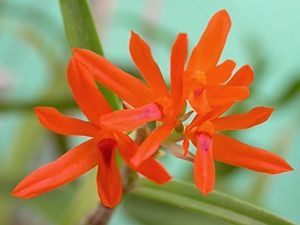Hexisea: Difference between revisions
imported>Dalton Holland Baptista No edit summary |
imported>Dalton Holland Baptista No edit summary |
||
| Line 1: | Line 1: | ||
{{subpages}} | {{subpages}} | ||
{{Image|Scaphyglottis bidentata.jpg|right|300px|'''''Scaphyglottis bidentata'''''<br><small>This species, now classified under the genus ''Scaphyglottis'', is the type species of ''Hexisea''. The species that once belonged to ''Hexisea'' are the most showy ''Scaphyglottis'' species because they have red flowers.</small>}} | {{Image|Scaphyglottis bidentata.jpg|right|300px|'''''Scaphyglottis bidentata'''''<br><small>This species, now classified under the genus ''Scaphyglottis'', is the type species of ''Hexisea''. The species that once belonged to ''Hexisea'' are the most showy ''Scaphyglottis'' species because they have red flowers.</small>}} | ||
'''''Hexisea''''' is an orchid genus currently considered a synonym of genus ''[[Scaphyglottis]]. ''Hexisea'' was described by John Lindley in 1834 and its type species is ''H. bidentata''. | '''''Hexisea''''' is an orchid genus currently considered a synonym of genus ''[[Scaphyglottis]]''. ''Hexisea'' was described by [[John Lindley]] in 1834 and its type species is ''H. bidentata''. | ||
''Hexisea'' and ''Scaphyglottis'' used to be separated because ''Hexisea'' | ''Hexisea'' and ''Scaphyglottis'' used to be separated because ''Hexisea'' [[flower]]s have the [[labellum]] partially fused to the [[column (botany|column]] base; it is not motile and is abruptly bent down after the column, furthermore, the columns of their flowers do not show a well developed foot. | ||
Previously to the name ''Hexisea'', sometimes misspelled in literature as ''Hexesea'' and ''Hexisia'', was rejected by the [[Intenational Code of Botanical Nomenclature]] against ''[[Scaphyglottis]]'', its five accepted species were, ''H. arctata'', ''H. bidentata'', ''H. imbricata'', ''H. lankesteri'' and ''H. oppositifolia''. | Previously to the name ''Hexisea'', sometimes misspelled in literature as ''Hexesea'' and ''Hexisia'', was rejected by the [[Intenational Code of Botanical Nomenclature]] against ''[[Scaphyglottis]]'', its five accepted species were, ''H. arctata'', ''H. bidentata'', ''H. imbricata'', ''H. lankesteri'' and ''H. oppositifolia''. | ||
| Line 9: | Line 9: | ||
From these, three were moved to ''Scaphyglottis'' before 1993, when [[Robert Louis Dressler]] published his ''Field guide to the orchids of Costa Rica and Panama''. | From these, three were moved to ''Scaphyglottis'' before 1993, when [[Robert Louis Dressler]] published his ''Field guide to the orchids of Costa Rica and Panama''. | ||
The remaining species were ''H. bidentata'' and ''H. imbricata''. They are the most showy ''Scaphyglottis'' species because they have red flowers. Both are pollinated by [[hummingbird]]s and can be separated by a yellow callus ''H. imbricata'' has on the | The remaining species were ''H. bidentata'' and ''H. imbricata''. They are the most showy ''Scaphyglottis'' species because they have red flowers. Both are pollinated by [[hummingbird]]s and can be separated by a yellow callus ''H. imbricata'' has on the labellum and in ''H. bidentata'' is replaced by a triangular purple mark that goes down towards its apex. | ||
==List of synonyms== | ==List of synonyms== | ||
Revision as of 11:48, 31 March 2009
Hexisea is an orchid genus currently considered a synonym of genus Scaphyglottis. Hexisea was described by John Lindley in 1834 and its type species is H. bidentata.
Hexisea and Scaphyglottis used to be separated because Hexisea flowers have the labellum partially fused to the column base; it is not motile and is abruptly bent down after the column, furthermore, the columns of their flowers do not show a well developed foot.
Previously to the name Hexisea, sometimes misspelled in literature as Hexesea and Hexisia, was rejected by the Intenational Code of Botanical Nomenclature against Scaphyglottis, its five accepted species were, H. arctata, H. bidentata, H. imbricata, H. lankesteri and H. oppositifolia.
From these, three were moved to Scaphyglottis before 1993, when Robert Louis Dressler published his Field guide to the orchids of Costa Rica and Panama.
The remaining species were H. bidentata and H. imbricata. They are the most showy Scaphyglottis species because they have red flowers. Both are pollinated by hummingbirds and can be separated by a yellow callus H. imbricata has on the labellum and in H. bidentata is replaced by a triangular purple mark that goes down towards its apex.
List of synonyms
- Hexisea Lindl., J. Bot. (Hooker) 1: 7 (1834) see Scaphyglottis.
- H. amparoana (Schltr.) Ames, F.T.Hubb. & C.Schweinf., Bot. Mus. Leafl. 3: 40 (1934) see Scaphyglottis amparoana.
- H. arctata Dressler, Orquídea (Mexico City), n.s., 7: 223 (1979) see Scaphyglottis arctata.
- H. aurea (Rchb.f.) Dressler, Taxon 13: 246 (1964) see Scaphyglottis aurea.
- H. bicornis (Lindl.) Dressler, Phytologia 21: 442 (1971) see Scaphyglottis bicornis.
- H. bidentata Lindl., J. Bot. (Hooker) 1: 8 (1834) see Scaphyglottis bidentata.
- H. bidentata var. imbricata (Lindl.) C.Schweinf., Bot. Mus. Leafl. 15: 106 (1951) see Scaphyglottis imbricata.
- H. cuniculata (Schltr.) Ames, Schedul. Orchid. 9: 48 (1925) see Scaphyglottis cuniculata.
- H. imbricata (Lindl.) Rchb.f. in W.G.Walpers, Ann. Bot. Syst. 6: 470 (1862) see Scaphyglottis imbricata.
- H. lankesteri Ames, Schedul. Orchid. 9: 47 (1925) see Scaphyglottis subulata.
- H. oppositifolia (A.Rich. & Galeotti) Rchb.f. in W.G.Walpers, Ann. Bot. Syst. 6: 470 (1862) see Scaphyglottis imbricata.
- H. reflexa (Lindl.) Rchb.f. ex Griseb., Fl. Brit. W. I.: 623 (1864) see Scaphyglottis reflexa.
- H. reflexa Rchb.f., Linnaea 41: 131 (1877) see Scaphyglottis emarginata.
- H. sigmoidea Ames & C.Schweinf., Schedul. Orchid. 8: 39 (1925) see Scaphyglottis sigmoidea.
